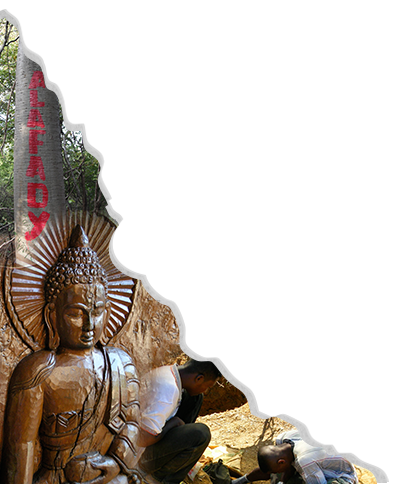Innovations in Anthropology Series
Welcome to the Innovations in Anthropology Series, a blog series devoted to profiling the teaching, production, and dissemination of anthropological knowledge. Whether it’s gamifying teaching, placing a department more closely in its local context, exploring multimodal methodologies, collaborating across disciplines and institutions, or highlighting the importance of ethnographic research with a variety of publics, these anthropologists and their collaborators are finding new ways to leverage the unique strengths of anthropological research and approaches. With contributions from Towson University, The Laboratory of Speculative Fiction, the Ethnography Lab at University of Toronto, the Centre for Ethnography at University of California Irvine and more, we invite you to join us as we tour these spaces of innovation in the coming months.
Playing Theory (Part One)
By Matthew Slover Durington and Samuel Gerald Collins
The first contribution in this Series is a two-part blog post that outlines the rationale and strategies for taking a more innovative approach to teaching anthropological theory. Avoiding the tendency to choose between lionizing the past or critiquing the colonial underpinnings of the discipline, Matthew Durington and Samuel Collins walk up the middle of this polarized debate by embracing the principles of design anthropology and the strategies of both remixing and gaming in their teaching.
A quick survey of many anthropological theory courses across the discipline at both the undergraduate and graduate level would inevitably show the ‘greatest hits’ of anthropological theories from functionalism to structuralism and beyond. This intellectual heritage should not necessarily be dismissed, but, to paraphrase Coco Fusco in a social theory class from over 20 years ago, these ‘greatest hits’ are often a revisitation and revalidation of the tomes of our favorite Eurocentric white guys in the history of the discipline and in social theory beyond anthropology. In fact, one of the major survey texts devoted to the history of theory in the discipline, “High Points in Anthropology”, was introduced to Durington in his theory survey course at Temple U by the late Peter Rigby as “Low Points in Anthropology” before commencing a semester of reading synopses of the great works of the discipline.
While we would never discount the importance of knowing where one comes from and giving proper homage, if not critical homage, to our forebears in the discipline, we came to realize many years ago that teaching this approach to anthropological theory is the best way to watch potential majors slowly back away from the discipline. Think about it: we often put very exciting ethnographies in front of our students in introductory courses (hopefully), only to have them reach an apex in their degree plan where we lay down tomes of a colonial past in the discipline that we spend countless amounts of time trying to contextualize and disrupt. So, should we ignore the theorists of anthropological history and the various approaches they developed? Should we give that up and only focus on social theory outside of the discipline? Should we create alternative ways to approach theory from the Global South or other non-Eurocentric spaces? Perhaps a combination of all three? Here’s what we’ve done to “remix” anthropological theory for our classes.
The Remix Ethic
While remix is ordinarily associated with the digital world of memes, music, and fandom, its development within digital platforms has prompted our reflection on the prevalence of remix in anthropological work. With their eclectic appropriations of epistemologies and methodologies, anthropologies have been remixers avant la lettre (Collins and Durington 2015: 69). Historically, this has meant remixing in the service of the colonialist machine, as Clifford (1988: 120-21) described:
The “primitive” societies of the planet were increasingly available as aesthetic, cosmological, and scientific resources. These possibilities drew on something more than an older Orientalism; they required modern ethnography. The postwar context was structured by a basically oneiric experience of culture. For every local custom or truth there was always an exotic alternative, a possible juxtaposition or incongruity.
In other words, anthropology has been imbricated in remix for some time, albeit in a way that worked to reinforce colonial inequalities and structural racism. Anthropologists remixed culture for their own nefarious purposes: as proofs of indigenous inferiority, as laboratories for suspect generalizations about gender, as bland multiculturalism for appropriation into the capitalist machine.
But remix need not be in the service of the settler colony. In many ways, anthropologists learned the wrong lesson about remix—that anthropologists can learn more about the natives’ cultures than the natives themselves. Remix is always about power and privilege. What anthropologists *should* have learned is that the people they work with remix their world, and one role of the anthropologist should be to help facilitate and validate that process, and that includes remixing the work of the anthropologist themselves. Remix can be a form of subversive critique, one that questions the assumptions of the past. In this respect, remix is the moral imperative of the student vis-a-vis their teachers.
We started doing this with theory almost twenty years ago with texts that had passed into the public domain—nearly forgotten texts like E.B. Tylor’s Anthropology: An Introduction to Man and Civilization (1893). There are reasons why Tylor’s textbook has been forgotten, but we assigned this archaic work to our students as a challenge—could they transform it through their notes and emendations, through re-writing, through parody, irony, and pastiche. Downloadable as a public domain pdf file, we found we could re-work the text in all kinds of ways—and even publish the results of our work online. It would be difficult to call the confrontation with Tylor’s unremitting colonialism, classism, and racism a form of “fun,” but we presented it as a vaguely gamefied challenge— “find four ‘theories’ that you disagree with, and re-work them through text and media to a) reflect your disagreement; and b) to gesture towards more contemporary theory in the field.”
The Turn Toward Games
Over the last four years we have taken an approach to teaching anthropological theory and other courses embedded in game design. This follows a larger trajectory of incorporating both games and game design into pedagogy in various disciplines and industries. And, as we have noted in other publications (Collins Durington Gill 2017) there is a history of bringing game design into anthropology. Even Margaret Mead designed a game.
One approach is to simply play serious games in your classroom that are not designed for anthropology but delve topically into the same areas such as police brutality or lack of economic resources. In a sea of terminology that includes game mechanics, gamification, and game-based learning to just name a few, we tend to rest our work with game design to emphasize the simultaneous construction of games and specific knowledges that derive from their development. In other words, the process of designing a game, or the carpentry involved therein (Bogost 2012), should create a set of outcomes just as much as the end game would. Design anthropology…. So how to go about it?
References
Bogost, Ian (2012). Alien Phenomenology, or What It’s Like to Be a Thing (Posthumanities) Minneapolis: University of Minnesota Press.
Collins, Samuel Gerald and Matthew Durington (2014). Networked ANthropology. NY: Routledge Press.
Collins, Samuel Gerald and Matthew Durington and Harjant Gill (2017) “Multimodality: An Invitation” American Anthropologist (119)1:142-153.
Tylor, Edward Burnett (1893). Anthropology: An Introduction to Man and Civilization. NY: D. Appleton and Co.
Samuel Collins is a cultural anthropologist interested in information society and globalization, primarily in the United States and Korea. His M.A. and Ph.D. are from American University in Washington, D.C. Before he became a professor at Towson University, he taught at Dongseo University in Pusan, South Korea.
Matthew Durington (@mdurington) received his B.A. in Humanities specializing in Film, Anthropology, Sociology and African and African American Studies at the University of Texas in 1994. He completed his M.A. Ph.D. in Anthropology at Temple University, specializing in urban and visual anthropology. He is the co-author with Samuel Gerald Collins of Networked Anthropology (Routledge: 2014) He has been designing games for teaching anthropology with student colleagues for four years with a variety of outcomes including Cards Against Anthropology (@anthrocards).




